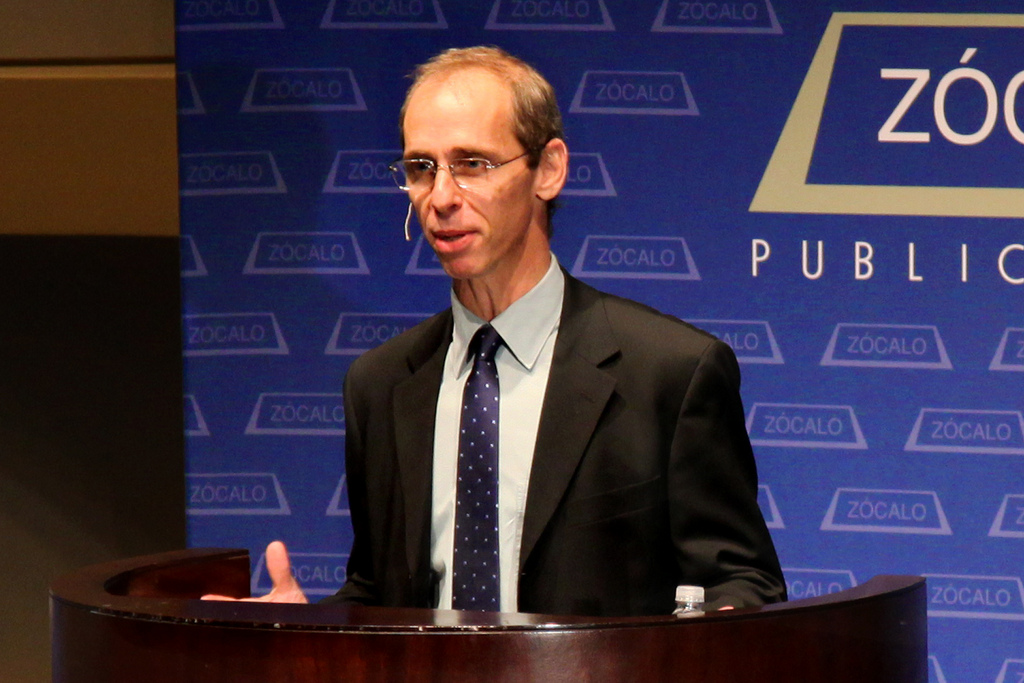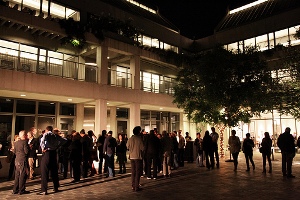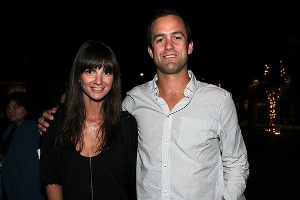
After years as a foreign correspondent reporting from war-torn countries, Peter Maass began to notice they all had something in common.
“Oil,” he told the audience at the Skirball Cultural Center. “It was everywhere I had been. When I was in Bosnia, people would say, ‘If only we had oil the Americans would save us.’ In the Middle East, people would say, ‘If only we didn’t have oil, we wouldn’t get invaded so much.’”
Maass began work on what would become Crude World: The Violent Twilight of Oil, initially imagining that he would take various jobs in the oil industry and tell the story from inside – swabbing the decks of a tanker, or becoming a “roughneck” on an oil field. “I know you’re all looking at me saying,” he said to a laugh from the crowd, “this is not roughneck material.”
Instead of laboring, Maass traveled around the world trying to find the real price of oil by talking to those most directly affected by it. It’s costlier than we know, Maass said, and the reasons why are harder to discern than we think.
Keep Nigeria Safe and Clean
Maass’s trip to Nigeria required navigating through treacherous waters, in some cases literally. The country is one of the largest oil producers in the world, possessed of “a particularly light, sweet type of oil that is easy to refine and particularly prized,” Maass said. Since the 1960s, Nigeria has earned $400 billion in revenues from oil, and yet, eight of 10 Nigerians live at or below the poverty level, and one in five Nigerian children dies before reaching the age of five. The country is mired in corruption. And it faces a war that is not a conflict between states, or even between a state and a non-state faction, but rather one that is “a complex conflict system,” with fighting between official armed forces and several militias, which also fight among themselves.
 To travel into the Niger Delta, Maass first had to ask permission from the current “alpha warlord.” He agreed, and assigned Maass a guide to take him by canoe down the creeks. Flares erupted from all sides – quite unlike American oil fields, Maass noted. His guide complained that he had fished for a day and had only six minnow-sized fish to show for it, because of pollution in the water from oil companies. They passed an island, Maass said, known as “Little Russia” where prostitutes lived and entertained soldiers and oil riggers. A floe station dripped fluid into the streams directly below a sign that read “Keep Nigeria Safe and Clean.”
To travel into the Niger Delta, Maass first had to ask permission from the current “alpha warlord.” He agreed, and assigned Maass a guide to take him by canoe down the creeks. Flares erupted from all sides – quite unlike American oil fields, Maass noted. His guide complained that he had fished for a day and had only six minnow-sized fish to show for it, because of pollution in the water from oil companies. They passed an island, Maass said, known as “Little Russia” where prostitutes lived and entertained soldiers and oil riggers. A floe station dripped fluid into the streams directly below a sign that read “Keep Nigeria Safe and Clean.”
One particularly destitute village, ravaged by attacks and lacking running water and electricity, sat surrounded by a “fecal stench” emanating from nearby water. But it also sat opposite the lush, well-kept and well-protected lawns of a modern oil facility. Oil “provides us this wonderful lifestyle we have, and the people who are actually there don’t benefit,” Maass said. “They suffer because they end up fighting over what little they can get.”
Apologies to Tolstoy
Maass traveled to Iraq at the start of the war, taking an SUV across the border from Kuwait and traveling with the marine battalion that infamously toppled the statue of Saddam Hussein. In those early weeks, Maass also witnessed looting everywhere except the Ministry of Oil, which Americans secured, and the refinery, where Iraqi workers organized a defense force. “If you want to know about America’s intricate and longstanding relations with Iraq,” Maass said, “Go to the refinery.” There, portraits of past refinery directors hang on the walls; the first ten are American or British. The current workers still punched an IBM-made time clock.
 After March 2003, the Americans charged a soldier with running the refinery, though he knew nothing about the industry. The fact that the refinery wasn’t well secured by Americans, Maass notes, was a major contrast from the Persian Gulf War. The Iraq war was about oil, Maass said, but “it was not the absolute only thing.”
After March 2003, the Americans charged a soldier with running the refinery, though he knew nothing about the industry. The fact that the refinery wasn’t well secured by Americans, Maass notes, was a major contrast from the Persian Gulf War. The Iraq war was about oil, Maass said, but “it was not the absolute only thing.”
Also while in Iraq, Maass had the chance to interview a Saudi jihadi. Saudi Arabia demonstrates that every unhappy oil country is unhappy in its own way, Maass said, adding, “with great apologies to Tolstoy.” Saudi Arabia is fairly wealthy, unlike Nigeria. Oil money funds a decent living standard, but it also funds, and motivates, Islamic extremism. The jihadi Maass interviewed noted that, though he was in university, he had no job prospects. Oil doesn’t create enough jobs, Maass said. And when Maass asked the young man why America was in Iraq, the man said, “It’s all about oil.”
“Whether or not we think so,” Maass said, “there are a lot of people who do, and who take action against us because of that.”
Get Out of Jail, Not Quite Free
Equatorial Guinea expelled Maass after eight days, but not before he learned a lesson about American power. The small West African country has been ruled by the same brutal dictator – who ousted and executed his uncle to get the job – for about 30 years. “You may have a dysfunctional family,” Maass said, “but it’s nothing compared to what’s going on over there.”
Still, American companies maintain a strong presence, and their business is crucial enough to the ruling regime that when Maass was accused of being a spy and threatened with a prison interrogation, invoking the U.S. government saved him. He bluffed that the U.S. would punish Equatorial Guinea for any mistreatment he suffered. “I could wave my passport and say, ‘You can’t touch me.’ It got me out of jail, almost literally,” Maass said. “Of course it’s no good for the people of Equatorial Guinea.” Maass acknowledged in Q&A that some money is finally trickling down to the people, but not enough and not quickly. And competition for the U.S. from Chinese companies, Maass added, could make for “a race to the bottom,” justifying ever more harmful deals and lax ethics to secure oil.
American relationships with oil-producing countries are complicated and difficult to change, Maass said, or even to make transparent. He interviewed one prominent American consultant, Jim Giffen, “the right hand man” to Kazakhstan’s president. Giffen negotiated all Kazakh contracts with American oil companies – and was indicted on bribery charges of $80 million. He easily posted a $10 million bond, Maass said, and his trial has been postponed because Giffen claimed a relationship with U.S. intelligence agencies. Indeed, Maass said, Giffen, like the corrupt oil executive character he inspired in the film Syriana, had no shame, and believed he was acting in the U.S.’s best interests.
But others, Maass said, believe U.S. interests lie elsewhere: Barack Obama is a proponent of clean energy, even if he faces the same entrenched interests and financial problems that George W. Bush did. Many in the oil industry and outside it are arguing for more transparency in financial transactions between oil companies and oil-producing countries. When everyone knows how much money is changing hands, Maass said, “The money is harder to steal.” And it would help American politicians be able to talk honestly about oil. “The hope is we can make more informed decisions about the true costs of oil. Either we accept them, we live with the blood that may be mixed into our gas tanks,” Maass said, “or we move toward the post-oil future.”
Watch the video here.
See more photos here.
Buy the book here.
*Photos by Aaron Salcido.





Send A Letter To the Editors